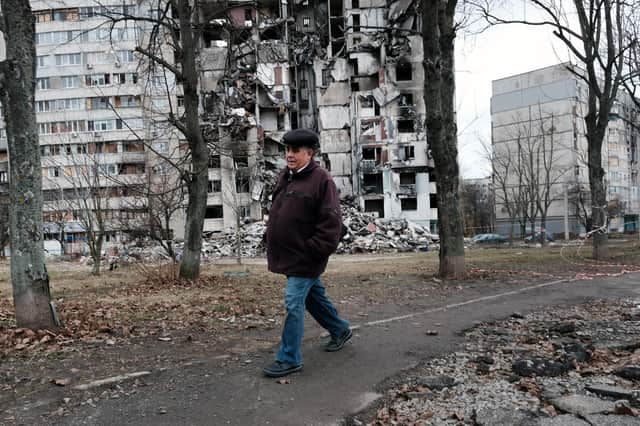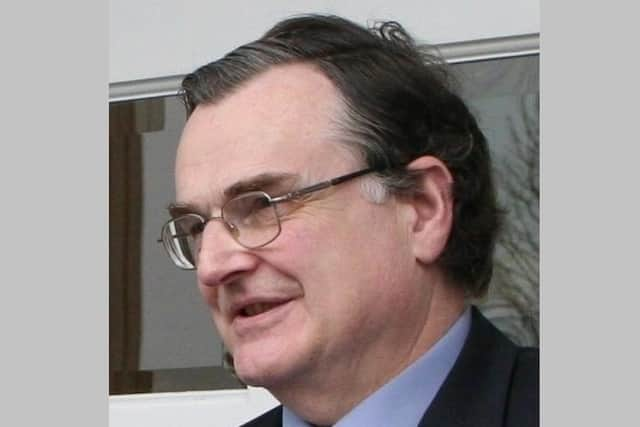Ian Ellis: In 2023, at home and abroad, it’s a challenge to be optimistic


Perhaps this time of the year was ever thus, but on this occasion the challenge to optimism somehow seems to be all the more pronounced.
Closest to home, we are facing a continued impasse at Stormont.
Advertisement
Hide AdAdvertisement
Hide AdOf course, Westminster is perfectly capable of taking necessary actions when it chooses.


For example, in 2019, at another time when Stormont was not functioning, abortion laws were introduced for Northern Ireland by Westminster in a move that the clerk of the Presbyterian general assembly, Rev Trevor Gribben, has described as having given rise to “the most destructive liberal abortion regime in these islands”.
Also very disturbing is the fact that the people of Northern Ireland have seen a delay in the roll-out of the central government's £600 winter energy payment scheme.
For so many people the financial help was vitally needed long before now.
Advertisement
Hide AdAdvertisement
Hide AdThen again, as in other parts of the UK, in this winter of discontent more strikes are threatened in different sectors.
It has been especially tragic to see NHS staff feeling they are left with no alternative to withdrawing their labour.
The NHS has not arrived at this breaking point all of a sudden and nor can it be fixed all of a sudden.
What is urgently needed is a proper plan that is actually put into action.
Advertisement
Hide AdAdvertisement
Hide AdIt has been said that the two most important things about the UK for British people are the monarchy and the NHS.
As one who has benefited so much from the NHS over the course of my life I am saddened to see the institution having deteriorated to a state in which nurses often are relying on foodbanks to feed their families.
In dealing with people's health, NHS staff need not to be exhausted and it is therefore anything but reassuring to be told they are facing ever-growing pressures.
At the international level, there are wars and conflicts raging across the globe.
Advertisement
Hide AdAdvertisement
Hide AdWe are most familiar with the war in Ukraine which has caused Europe's greatest refugee crisis since World War II.
Shortly before Christmas, Archbishop of Canterbury Justin Welby described the Russian aggression in Ukraine, very strikingly, as having “opened the gates of hell".
He was referring to the extreme suffering in the war itself as well to its consequences in famine around around the world and in the global impact of the resulting energy crisis.
Speaking on the BBC's Sunday with Laura Kuenssberg programme, Archbishop Welby told how, on a recent visit to Ukraine, he had been struck by the "size of the mass graves in Bucha, the photos of what had been done to the people there, the rape, the massacres, the torture by the occupying Russian forces".
Advertisement
Hide AdAdvertisement
Hide AdThe cruelty in the prosecution of the war has inflicted unimaginable suffering.
Also on the international front, in Afghanistan circumstances are deteriorating.
In his most recent quarterly report on the situation there, UN secretary-general António Guterres has indicated a steeply increasing number of security-related incidents, with violence against women and girls - ranging from murder, honour killings and suicides to forced marriages and beatings that cause injuries or disabilities - continuing.
Mr Gutteres continued: “The 2023 humanitarian response planning figures show that two thirds of the population, or 28.3 million people, will need humanitarian and protection assistance in 2023, up from 24.4 million in 2022 and 18.4 million at the beginning of 2021.”
Advertisement
Hide AdAdvertisement
Hide AdIn the week before Christmas, the Taliban excluded women from university education, having already excluded girls from most secondary schools.
At the end of December, top UN agency officials and civil society organisation heads joined forces to urge Afghanistan’s de facto authorities to reverse their ban on women working for non-governmental organisations that provide aid relief.
Then there is Iran. As well as continuing its crackdown on women's rights protestors, the country is assisting Russia with its war effort in Ukraine.
Defence secretary Ben Wallace has said that “Iran has become one of Russia's top military backers”.
Advertisement
Hide AdAdvertisement
Hide AdSo from Northern Ireland to many places around the world, things are far from easy and 2023 may even appear to be doomed.
By contrast, however, the good news is that:
there is an international order that can assert itself;Russia has very few real friends;government in the UK can rise to its national challenges; andin Northern Ireland, whether or not the forthcoming 25th anniversary of the Belfast Agreement sees a restored local administration, we have shown ourselves, with time and cooperation, to have sufficient ingenuity to resolve even our most intractable difficulties.
We can have faith in ourselves and, despite many signs of surrounding adversity, a sure faith in the supporting presence of God through the most difficult of times.
Yes, it is an understandable question, as to where God is when there is cruelty, suffering and injustice all around.
Advertisement
Hide AdAdvertisement
Hide AdThe best answer I can give to that question is that God is to be found wherever the inextinguishable and eternal flame of love truly is alive and bears fruit in care and kindness.
Canon Ian Ellis is a former editor of The Church of Ireland Gazette.